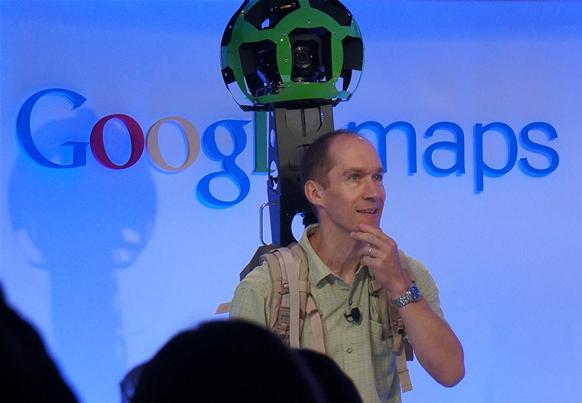
Google has presented new mapping technologies in an effort to reassert its position as a market leader.
While it boasts one billion users, Google Maps has recently seen defections by some key developers and partners.
Reports suggest Apple may abandon Google Maps next week at its annual developer conference.
They suggest Apple may announce its own mapping application to replace Google Maps on its smartphones and tablets.
To counteract any negative publicity, Google executives held a media event on Wednesday in San Francisco to preview new mapping features and trumpet a decade of achievements in digital mapping, including its use of satellite, aerial and street-level views.
Among the stand-out features were 3D enhancements to Google Earth, a portable device for taking “street view” panoramic photos and offline access to Google Maps on Android phones.
“It’s much more than finding a way home,” said Brian McClendon, vice president of engineering for Google Maps.

Google Imagery, the company’s most sophisticated 3D rendering to date, makes use of an automated process to generate very detailed models from 45-degree aerial photos. Google has actually commissioned a fleet of planes to do the job. The end result is zoomable, three-dimensional cityscapes, complete with top and side level views of buildings, streets and landscaping.
Fly-over views of San Francisco’s Civic Center, City Hall, AT&T Ballpark and waterfront were shown during Wednesday’s demonstration.
“We are trying to create magic here,” said Peter Birch, program manager for Google Maps, who compared the offering to “Superman wings.”
“It’s almost as if you are in a personal helicopter hovering over the city,” he said.
The feature will be available on both Android and iOs devices in a matter of weeks, said Peter Birch.
He would not be drawn on the possibility of a snag with Apple if Google Maps is de-bundled from Apple’s smartphones and tablets: “I can’t really speculate on what the rumors may be… Apple is a good partner of ours.”
“We have a lot fantastic applications already on the platform. Google Earth is one of the top applications, and we’ve been on Apple devices since 2008,” he said.
“It’s a really fantastic showcase for the platform and we’re really excited to be offering new features.”
Google aims to bring the new 3D imagery to desktops later this year.
By the end of the year, the California-based company anticipates 300 million people will be able to look at their communities using this technology. The initial metropolitan areas were not specified, but Peter Birch indicated both American and international cities would be part of the initial rollout.
Should Apple actually divest Google Maps from its mobile screens later this year, as the Wall Street Journal first reported, experts say it would be a strike against the search giant.
“It’s a negative for Google, but it’s not going to have a big revenue impact, and it may in fact motivate them the create a more powerful mapping application that people can download from the iTunes store if Apple doesn’t try to block it,” said Greg Sterling, a long-time Google watcher and contributing editor at Search Engine Land.
“It’s a platform battle,” according to Di-Ann Eisnor, a social mapping expert and vice president of Waze, a commuter tool that relies on real-time crowdsourced data from its 18.5 million users to inform its mobile mapping application.
But the war goes beyond Android versus iOs.
Google created a backlash of sorts when it began charging for commercial use of its API last autumn. Developers and publishers like Foursquare, the location-based, mobile check-in app with 20 million users, opted to go with the free and volunteer-driven OpenStreetMap, the world’s largest crowdsourced atlas, as its baseline mapping technology, instead of Google Maps. So did the mobile version of Wikipedia.
With 600,000 registered users, OpenStreetMap also has the support of Microsoft. As more big players start working on OpenStreetMap, Di-Ann Eisnor and others say it could be another “viable alternative” to Android and iOs.
John Jackson, a technology analyst with CCS Insight in Boston agrees with the notion of platform wars, calling it “an epic battle for the future of mobile computing”.
Between Apple, Google and Microsoft, “we may end up with three centres of gravity”, he said.